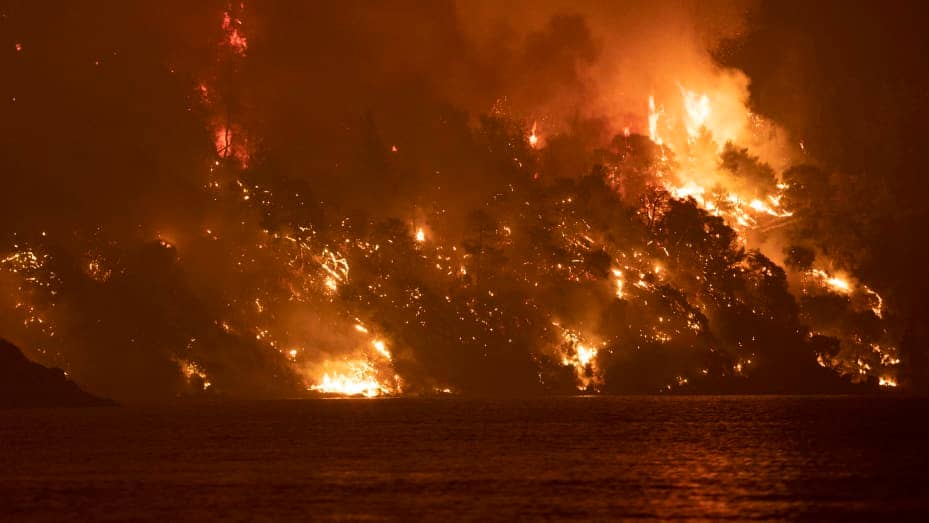In August 2023, Greece experienced a devastating wave of wildfires that left the nation grappling with an ecological and humanitarian crisis. These fires, which swept through forests, villages, and agricultural lands, brought into sharp focus the undeniable connection between climate change and the increasing frequency and intensity of such disasters – we were able to see relation of Greek Wildfires and Global Warming. This blog post explores the Greece fires of August 2023 and delves into the significant role that climate change plays in exacerbating such events.

August 2023
The Unprecedented Fury of the Greece Fires
The Greece fires of August 2023 were unprecedented in their scale and ferocity. Whole communities were evacuated, and firefighters from Greece and across Europe battled tirelessly to control the blazes. Thousands of homes were destroyed, and lives were lost. But what made these fires so extraordinary, and why should we be concerned about their link to climate change?
- Prolonged Heatwaves: A Climate Change Signature
One of the primary factors that contributed to the severity of the Greece fires was a prolonged period of extreme heat. Heatwaves have become more frequent and intense due to rising global temperatures, a direct consequence of climate change. These extended periods of high temperatures create the ideal conditions for wildfires to ignite and spread rapidly, as dry vegetation becomes highly flammable.
In Greece, the summer of 2023 was marked by record-breaking heat, with temperatures soaring well above average. This extreme heat provided the perfect tinder for the fires that eventually raged across the country.
- Drought and Dry Conditions
Another critical factor that fueled the fires was a prolonged period of drought and dry conditions. Climate change has altered precipitation patterns in many regions, leading to more extended periods of drought. In Greece, decreased rainfall and higher evaporation rates dried out forests, grasslands, and crops, turning them into combustible material.
The lack of moisture in the landscape made it easier for the fires to ignite and spread rapidly, making containment efforts even more challenging.
- Changing Wind Patterns
Climate change can also influence wind patterns, which play a crucial role in wildfire behavior. Unpredictable and strong winds can carry embers over long distances, sparking new fires and causing existing ones to grow rapidly. The Greece fires of 2023 experienced erratic wind patterns that hindered firefighting efforts and allowed the flames to jump containment lines.
The Impact on Biodiversity
Beyond the immediate threats to human life and property, these wildfires had a devastating impact on Greece’s rich biodiversity. The fires consumed vast stretches of forests, which are home to numerous plant and animal species, many of which are endemic and at risk of extinction.
Loss of habitat due to wildfires can have long-lasting consequences for these species, making it harder for them to recover and thrive in the face of climate change. Furthermore, the smoke and ash produced by the fires can degrade air and water quality, further harming ecosystems.
Lives were lost…
The human toll of the Greece fires of 2023 was heartbreaking. Lives were lost, families were displaced, and communities were shattered. The fires caused widespread trauma and grief, leaving scars that will endure for generations.
Moreover, the economic impact of such disasters is significant. The destruction of homes, businesses, and infrastructure not only strains national resources but also sets back local economies, making recovery a slow and challenging process.

The Urgent Need for Climate Action
The Greece fires of August 2023 serve as a stark reminder of the urgency of addressing climate change. While wildfires are a natural part of many ecosystems, their increasing frequency and intensity are directly linked to human activities that release greenhouse gases into the atmosphere.
Governments, businesses, and individuals all have a role to play in mitigating climate change and reducing the risk of such devastating wildfires in the future. Here are some steps that can be taken:
- Transition to Renewable Energy: One of the most effective ways to combat climate change is by reducing our reliance on fossil fuels. Governments can promote the transition to renewable energy sources such as wind and solar power, which produce fewer greenhouse gas emissions.
- Reforestation and Forest Management: Protecting and restoring forests is essential for mitigating wildfires. Proper forest management can reduce the fuel available for fires, making them easier to control.
- Promote Sustainable Agriculture: Sustainable farming practices can help reduce the impacts of drought and extreme weather events on agriculture, thereby reducing food insecurity and the risk of wildfires.
- Reduce Carbon Footprints: Individuals can reduce their carbon footprints by using public transportation, conserving energy, and making sustainable choices in their daily lives.
- Support Climate Policy: Advocating for policies that address climate change at the local, national, and international levels is crucial. Governments must take bold action to reduce greenhouse gas emissions and prepare for the impacts of a changing climate.
Conslusion
The Greece fires of August 2023 were a harrowing reminder of the devastating consequences of climate change. From extreme heatwaves to prolonged droughts and erratic wind patterns, the conditions that fueled these fires are directly linked to the warming of our planet. As we witness the growing frequency and intensity of such disasters, it is clear that urgent action is needed to mitigate climate change and protect our communities, ecosystems, and future generations.
It is my hope that the tragedy of the Greece fires serves as a wake-up call, inspiring individuals, communities, and nations to take meaningful steps towards a more sustainable and resilient future. The time for action is now, and our response to the climate crisis will determine the world we leave behind for our children and grandchildren.
